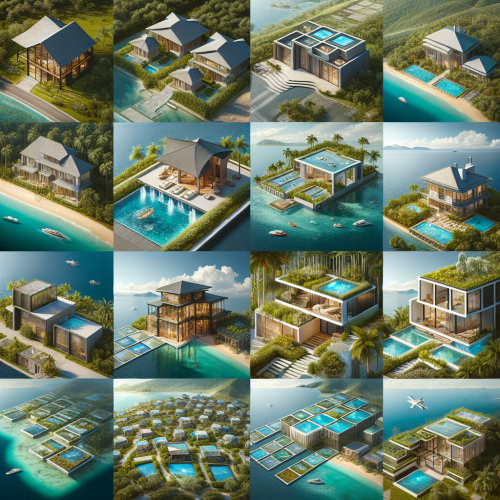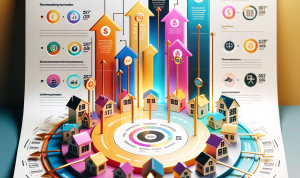Real Estate Properties – If you’re thinking about diving into real estate in 2025, I’m right there with you. It’s one of those things that feels a bit overwhelming at first, but once you get the hang of it, the potential rewards are huge. I’ve made my own mistakes along the way, but there’s definitely a sense of pride that comes with securing a solid investment property. If you’re looking for a few smart moves in the real estate market this year, here’s a rundown of the types of properties you should consider, from a personal perspective.

Real Estate Properties You Should Consider in 2025
1. Multi-Family Units: The Perfect Passive Income Generator
Okay, hear me out—multi-family units are probably one of the best investments you can make if you want to generate consistent passive income. I still remember the first time I walked through a duplex. It seemed like a no-brainer. You get two (or more) units, and the rent from one property could cover your mortgage, taxes, and then some. Over time, you’ll have the potential for equity build-up as the property appreciates.
Of course, like anything else, there’s a catch. Managing multiple tenants can get tricky, and you’ll need to stay on top of maintenance and repairs. But with the right approach, multi-family properties are a great way to get into real estate without stretching yourself too thin. If you’re new to the game, try starting with a duplex or triplex, especially in an area with growing rental demand.
Pro tip: Look for multi-family units in up-and-coming neighborhoods where demand for rental properties is rising. The rents might not be sky-high at first, but the property’s value will increase over time.
2. Vacation Rentals: Turning Short-Term Stays into Big Returns
Now, if you’re looking for something with a little more hustle, vacation rentals are something you should definitely think about in 2025. Think Airbnb or VRBO. I know, it might seem like an overly saturated market, but here’s the thing: with the right location, you can still do really well. Last year, I helped a friend set up his first vacation rental, and let me tell you, his place went from sitting empty to almost always being booked. It’s all about location—close to a beach, a ski resort, or even a big city that attracts tourists.
The key to success with vacation rentals is to stand out. You don’t need to throw a bunch of money at fancy upgrades, but little touches like offering free Wi-Fi, a comfortable work nook, or a fully equipped kitchen can go a long way. Plus, since you’re charging nightly rates, you can make back your investment faster than a long-term rental.
Pro tip: Make sure to look into local regulations on vacation rentals. Some areas have strict rules about short-term rentals, so don’t get caught off guard with fines or permit requirements.
3. Commercial Real Estate: The Big Leagues of Investment
I know, commercial real estate can sound intimidating. But hear me out. If you’re financially ready for a more substantial investment, a small commercial property (think office spaces or storefronts) could be the way to go. I’ve seen friends get into this space, and while it’s definitely more expensive than residential, the returns can be well worth it.
One of the best things about commercial properties is the stability of tenants. Unlike residential leases, commercial tenants typically sign longer leases, and they are often responsible for property maintenance. If you’re looking for a more hands-off type of real estate investment, this could be the way to go.
But don’t rush into it—commercial properties require more research, and you’ll want to understand the local economy, zoning laws, and the business market. However, if you get it right, the cash flow from commercial properties can be pretty spectacular.
Pro tip: Start by researching smaller commercial properties. An office building in an area with growing businesses or a strip mall near a busy intersection can yield great returns.
4. Fixer-Uppers: The Sweat Equity Option
If you’re a bit of a DIY enthusiast, or if you’ve got a contractor or renovation expert in your back pocket, investing in a fixer-upper might be right for you. I’ve personally been down this road, and I can tell you—there’s something really satisfying about transforming a property. It takes patience, time, and usually more money than you expect, but when done right, the return on investment (ROI) can be incredible.
In 2025, I think there will be a lot of opportunities to grab properties that need a little TLC, especially as many owners are eager to sell their properties due to the ongoing market fluctuations. It can be a risky move, but if you have the right vision for the property and a solid team of contractors, you could turn a neglected home into a profitable asset.
Pro tip: Be realistic about the budget and timeline for your renovations. Always leave some wiggle room for unexpected costs, and don’t underestimate how long it might take to complete the work.
5. Single-Family Homes: A Timeless Option
While multi-family units and commercial properties might get all the attention, let’s not forget the humble single-family home. This is the go-to option for many first-time real estate investors, and it’s still a solid choice in 2025. Single-family homes tend to be a bit more affordable than other types of properties, and they can be a great option for those looking to rent out a property long-term.
The beauty of single-family homes is that they are always in demand. Families, singles, and retirees all need places to live, and in many areas, buying a home is still one of the most reliable ways to build wealth over time. I’ve had great success with single-family homes in areas with good schools and close proximity to amenities like grocery stores and parks.
Pro tip: When looking for single-family homes to invest in, focus on neighborhoods with low crime rates, good schools, and a strong community vibe. These areas tend to have tenants that are more stable and tend to stay longer.
6. Raw Land: The Long-Term Play
This one might seem a little off-the-wall, but hear me out—raw land can be a surprisingly good investment. If you’re in a position to think long-term, purchasing undeveloped land in an area that’s poised for growth can pay off big time in the future. I had a relative who bought a few acres of land in an area on the edge of a growing city. While he didn’t make a ton of money in the first few years, once that land was developed and the city expanded, its value shot up.
Of course, buying raw land isn’t a quick-money solution. It can take years to see returns, but it’s definitely a strategy to keep in mind if you’ve got the patience and a bit of cash to set aside.
Pro tip: Research the land thoroughly before you buy. Ensure there are no zoning issues, and check whether utilities (water, electricity, etc.) are easily accessible.
Final Thoughts
So there you have it—five types of real estate properties you should consider in 2025. Whether you’re looking for passive income, a big flip, or a long-term investment, there’s a property type that fits your goals. The key is to do your homework, consider your budget, and understand the risks involved. Real estate can be a lucrative venture, but it’s important to make informed decisions that align with your financial goals. So, get ready to dive in, and good luck out there!



